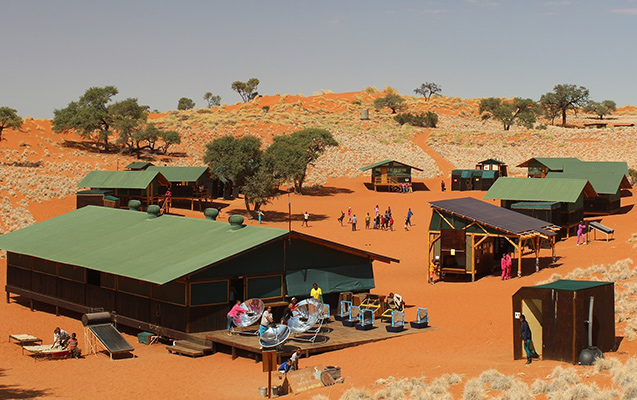WHAT began as a unique vision more than 17 years ago between a corporate banking entity and conservationists has blossomed into an internationally recognised collaboration – playing a pivotal role in putting Namibia at the forefront of conservation efforts globally.
The Nedbank Namibia Go Green Fund was established in 2001, in partnership with the Namibia Nature Foundation (NNF), as a non-profit fund to support individuals and organisations working towards a sustainable future for Namibians, endemic species and habitats.
“With over 40 projects the Nedbank Namibia Go Green Fund has fully or partly funded in the past 17 years, the project’s goal to promote conservation, education, sustainability, awareness and action, have been achieved,” Veripura Muukua, the Nedbank Go Green Fund coordinator at the NNF, said.
The fund supports environmental research projects into lichen fields, oxpeckers, baobab trees, Nile crocodiles and Cape ground squirrels, and community fishing projects, to name a few.
Grants have also been provided to support urgent work with elephants, the brown hyena, giraffes, the African wild dog, dolphins, and a range of carnivores as well as hot-button issues, human-wildlife conflict and poaching.
There was a time when corporate citizenship was noted as a mere PR exercise. But today visionary organisations actively and consistently engage with their communities.
Nedbank’s decision to align its corporate social investment goals to an environmental fund has been hailed as a benchmark in the way corporations could impact real issues on the ground in a long-lasting way.
In the Go Green Fund special edition conservation magazine, published in 2015, Lionel Matthews, the Nedbank managing director, stressed the importance of corporate leadership and responsibility.
“At Nedbank Namibia, we appreciate that funding is often very limited and that government can only do a restricted amount of environmental work. Funding from the private sector is therefore an absolute imperative to sustain the commitments made towards environmental conservation and protection,” he said.
The bank continues to demonstrate its commitment and environmental advocacy. To date, just under N$7 million in funding has been injected into a variety of projects that provide a true reflection of Namibia’s vast and rich environmental abundance and the people working to keep it intact.
Muukua noted that the Nedbank Go Green Fund “was the first fund of its kind in Namibia and others only moved into this field later.”
Another exclusive facet of the Nedbank Go Green Fund are a range of home-loan and vehicle-finance products that were developed to raise funds for go green enabling ordinary Namibians to play their part in conservation.
Discussion between Dr. Chris Brown – a Namibian environmental scientist – and Nedbank commenced in 2001 already.
This led to Nedbank taking the lead in setting up the first environmental fund to provide grants for select projects.
The NNF was contracted to manage the financial grant-making process for approved projects, to monitor progress and to render assistance. The impact of the fund has not been limited to the duration of project funding, but has in many cases been highly catalytic.
“It is amazing how some of the early projects that were supported by the Go Green Fund have gone on to have a major impact. In fact, almost all of the projects that we have supported have gone on to have a larger impact or have allowed us to a critical insight into an issue,” Muukua said.
The Kunene Lion project and the Namib Desert Environmental Education Trust (Nadeet) were two early beneficiaries of the Nedbank Go Green Fund, and both remain active and globally recognised.
Nadeet has, since its inception in 2003, received more than N$400 000 from the fund and the “long-lasting relationship has been significant to the success of Nadeet over the years to reach its goals,” the NNF said.
More than 12 000 children and adults from Namibia and across the borders have visited the centre to learn about the environment, eco-friendly life skills and the arid Namib Desert.
Nadeet, and its director, Viktoria Keding, have scooped numerous international awards for the work, a major boost not only for Nadeet, or the Go Green Fund, but also for Namibia as a whole.
The positive ripple effect of the fund’s focus on conservation has been noted frequently, including worldwide exposure to successful conservation tactics and economic benefits to local communities and the country.
Further, the fund has helped capacity building in several ways, one of which is strengthening skills in crafting project proposals and project management. Thirteen years ago there were just a few larger NGOs with this capacity. Now good project proposals come from remote villages across Namibia – noted by both Nedbank and the NNF.
Seventeen years of working hand-in-hand with conservationists has afforded the go green team a bird’s eye view of the changing landscape of environmental achievements, and challenges as they arise.
While the fund remains dedicated to focus on “overlooked issues and species, we also need to start exploring bigger societal concerns where smart green finance can help address matters and unlock more sustainable businesses,” Muukua said.
Two issues that were less pronounced 17 years ago is the increase of poaching and human-wildlife conflict, Muukua said. In line with this, the fund is teaming up with partners to combat poaching and on finding solutions to the challenges of communities living among valuable wildlife that threaten their livelihoods and lives. Ultimately, the Nedbank Namibia Go Green Fund is focused on maintaining a balance.
“We need to keep common species common and general landscapes functioning. On these two aspects the Go Green Fund stands out above other conservation funds,” Angus Middleton, executive director of the NNF wrote in the Go Green Fund conservation magazine.
Stay informed with The Namibian – your source for credible journalism. Get in-depth reporting and opinions for
only N$85 a month. Invest in journalism, invest in democracy –
Subscribe Now!






